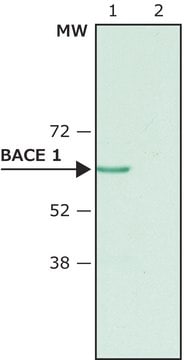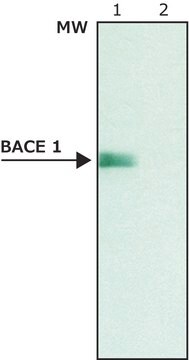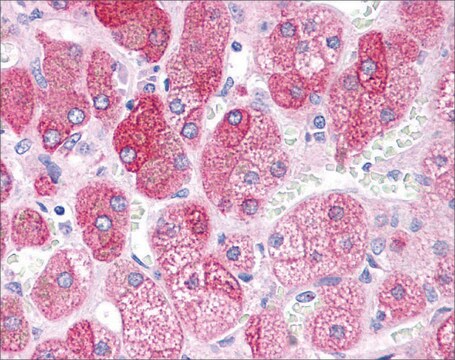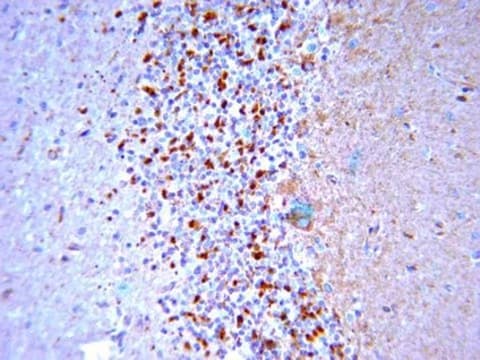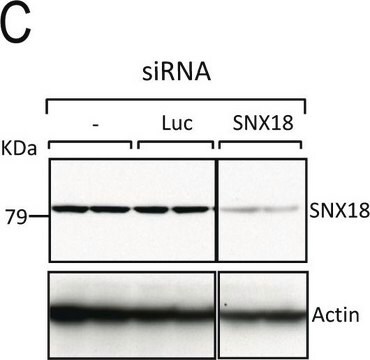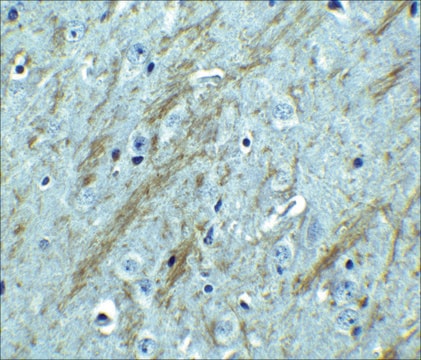추천 제품
생물학적 소스
mouse
Quality Level
항체 형태
purified immunoglobulin
항체 생산 유형
primary antibodies
클론
61-3E7, monoclonal
종 반응성
primate, mouse, human, rat
제조업체/상표
Chemicon®
기술
immunoprecipitation (IP): suitable
western blot: suitable
동형
IgG1
UniProt 수납 번호
배송 상태
wet ice
타겟 번역 후 변형
unmodified
유전자 정보
human ... BACE1(23621)
일반 설명
Alzheimer′s disease (AD) is characterized by the progressive formation in the brain of insoluble amyloid plaques and vascular deposits consisting of the 4-kD amyloid b-peptide (Ab). Ab generation is initiated by proteolytic cleavage of the amyloid precursor protein (APP) at the N-terminal of Ab by b-secretase. The Ab peptide is then released by proteolytic cleavage at its C-terminus by g-secretase. Because both these proteases are prime candidates for therapeutic intervention, an intense search has been underway to identify these two enzymes.A human transmembrane aspartic-protease (Asp2), referred to as BACE, has been characterized and shown to have all the properties of b-secretase. Four groups in all have now confirmed that BACE (or Asp2) is a convincing candidate for b-secretase.
BACE is an N-glycosylated integral membrane aspartyl protease with Mr=70 kDa. Mature BACE is produced from the immature form through a series of post-translational proteolytic cleavages and glycosylation. Sequence analysis has revealed that the immature form of BACE contains an N-terminal signal sequence (residues 1-21) followed by a large catalytic domain, a single transmembrane domain (residues 461-477), and a short cytoplasmic domain (residues 478-501). The signal sequence (1-21) is cleaved from the immature form by a signal peptidase located in the endoplasmic reticulum (ER), yielding the proBACE protein (Mr=75 kDa) which starts at residue 22. The proBACE protein is modified by cleavage of 24 N-terminal residues (aa 22-45), producing the mature BACE protein.
BACE is an N-glycosylated integral membrane aspartyl protease with Mr=70 kDa. Mature BACE is produced from the immature form through a series of post-translational proteolytic cleavages and glycosylation. Sequence analysis has revealed that the immature form of BACE contains an N-terminal signal sequence (residues 1-21) followed by a large catalytic domain, a single transmembrane domain (residues 461-477), and a short cytoplasmic domain (residues 478-501). The signal sequence (1-21) is cleaved from the immature form by a signal peptidase located in the endoplasmic reticulum (ER), yielding the proBACE protein (Mr=75 kDa) which starts at residue 22. The proBACE protein is modified by cleavage of 24 N-terminal residues (aa 22-45), producing the mature BACE protein.
특이성
Reacts with BACE (beta-site APP Cleaving Enzyme). Shows no reactivity to BACE2 by Western blot.
면역원
Epitope: C-terminus
Synthetic peptide corresponding to the C-terminus of human BACE.
애플리케이션
Detect BACE using this Anti-BACE Antibody, C-terminus, clone 61-3E7 validated for use in IP & WB.
Research Category
Neuroscience
Neuroscience
Research Sub Category
Neurodegenerative Diseases
Neurodegenerative Diseases
Western blotting: 1 μg/mL; recognizes pro and mature forms: ~60-75kDa on reducing westerns. BACE is N-terminally glycosylated which causes the wide size range.
Immunohistochemistry on paraformaldehyde fixed tissues from human, rat, mouse and monkey.
Immunocytochemistry on cells expressing BACE. Acetone or methanol fixation preferred; 4% PFA 5′, RT followed by 0.1% triton X-100 1 hour, can also be used. 1:200-1:500 is recommended, optimization is necessary.
Immunoprecipitation:
Optimal working dilutions must be determined by end user.
Immunohistochemistry on paraformaldehyde fixed tissues from human, rat, mouse and monkey.
Immunocytochemistry on cells expressing BACE. Acetone or methanol fixation preferred; 4% PFA 5′, RT followed by 0.1% triton X-100 1 hour, can also be used. 1:200-1:500 is recommended, optimization is necessary.
Immunoprecipitation:
Optimal working dilutions must be determined by end user.
표적 설명
~ 60-75 kDa
물리적 형태
Format: Purified
Protein A purified
Purified immunoglobulin. Liquid. Buffer = 0.02M Sodium Phosphate, 0.25M NaCl with 0.1% sodium azide.
저장 및 안정성
Maintain for 1 year at 2–8°C from date of shipment. Aliquot to avoid repeated freezing and thawing. For maximum recovery of product, centrifuge the original vial after thawing and prior to removing the cap.
분석 메모
Control
Brain
Brain
기타 정보
Concentration: Please refer to the Certificate of Analysis for the lot-specific concentration.
법적 정보
CHEMICON is a registered trademark of Merck KGaA, Darmstadt, Germany
면책조항
Unless otherwise stated in our catalog or other company documentation accompanying the product(s), our products are intended for research use only and are not to be used for any other purpose, which includes but is not limited to, unauthorized commercial uses, in vitro diagnostic uses, ex vivo or in vivo therapeutic uses or any type of consumption or application to humans or animals.
Not finding the right product?
Try our 제품 선택기 도구.
Storage Class Code
10 - Combustible liquids
WGK
WGK 2
Flash Point (°F)
Not applicable
Flash Point (°C)
Not applicable
시험 성적서(COA)
제품의 로트/배치 번호를 입력하여 시험 성적서(COA)을 검색하십시오. 로트 및 배치 번호는 제품 라벨에 있는 ‘로트’ 또는 ‘배치’라는 용어 뒤에서 찾을 수 있습니다.
Sindhu Ramesh et al.
PloS one, 13(1), e0190350-e0190350 (2018-01-13)
Honokiol (poly-phenolic lignan from Magnolia grandiflora) is a Sirtuin-3 (SIRT3) activator which exhibit antioxidant activity and augment mitochondrial functions in several experimental models. Modern evidence suggests the critical role of SIRT3 in the progression of several metabolic and neurodegenerative diseases.
BACE1 and BACE2 enzymatic activities in Alzheimer's disease.
Ahmed, RR; Holler, CJ; Webb, RL; Li, F; Beckett, TL; Murphy, MP
Journal of Neurochemistry null
Li Zhu et al.
The Journal of biological chemistry, 288(44), 32050-32063 (2013-09-21)
Recent studies link synaptojanin 1 (synj1), the main phosphoinositol (4,5)-biphosphate phosphatase (PI(4,5)P2-degrading enzyme) in the brain and synapses, to Alzheimer disease. Here we report a novel mechanism by which synj1 reversely regulates cellular clearance of amyloid-β (Aβ). Genetic down-regulation of
Beta-secretase activity increases with aging in human, monkey, and mouse brain.
Fukumoto, H; Rosene, DL; Moss, MB; Raju, S; Hyman, BT; Irizarry, MC
The American Journal of Pathology null
Yong Shen et al.
Biological psychiatry, 83(5), 447-455 (2017-04-01)
Increased beta-secretase 1 (BACE1) activity has consistently been detected in brain tissue and cerebrospinal fluid of subjects with mild cognitive impairment (MCI) and probable Alzheimer's disease (AD) compared with control subjects. The collection of cerebrospinal fluid by lumbar puncture is
자사의 과학자팀은 생명 과학, 재료 과학, 화학 합성, 크로마토그래피, 분석 및 기타 많은 영역을 포함한 모든 과학 분야에 경험이 있습니다..
고객지원팀으로 연락바랍니다.